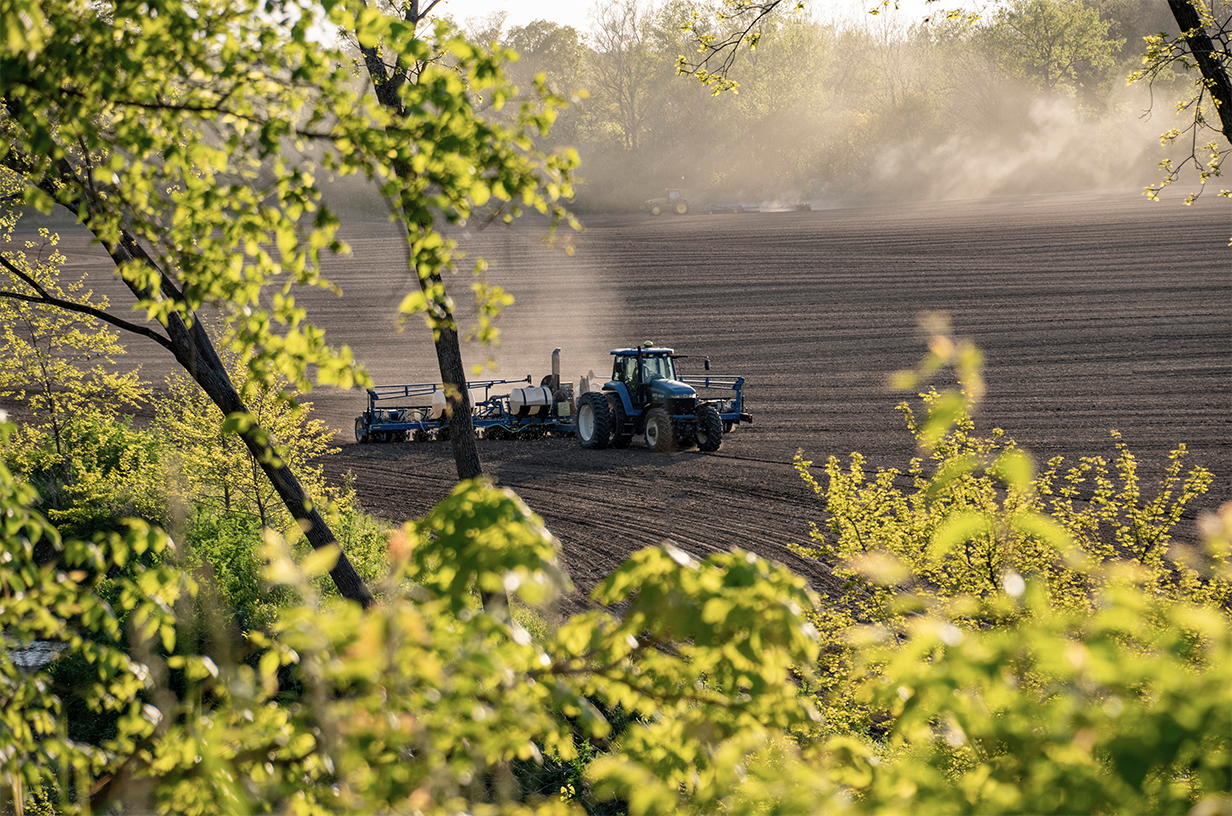Hot Topics in Ag
Find information about agriculture topics that are currently on the minds of many Indiana farmers. Contact the public policy team with any questions.
Hot Topics in Agriculture
Since farmers constitute less than 2% of the population, much of the general public has questions about modern farming. These topics may come up in conversations you have with community members not involved in agriculture. We’ve compiled key talking points surrounding these topics to help you tell your story.
Listen to the question. Don’t react or jump in with facts. First, empathize by expressing an understanding of why they may have these questions.
Don’t shy away from the tough questions. It is important to be honest and share why you do certain things on your farm. Think about the words you use to describe your farm and how that information will be received by someone not involved in agriculture.
Property Tax Notice of Assessments
Around May 1, 2025, Indiana Farm Bureau members should have received their Notice of Assessment (Form 11) in all but 52 counties. Members have been reaching out to INFB because of substantial increases on their notices.
The Notice of Assessment (Form 11) shows how much the taxable value of your property, both land and structures, has changed between January 1, 2024, to January 1, 2025.
Even if you think the change is reasonable, you should research your parcels to make sure the county assessor used accurate data about the characteristics and features of your property to calculate your assessed value.
Property record cards detail how your assessments are calculated. They can be found on the websites of county assessors, but you should still call or visit the county assessor for an explanation of what has occurred.
To initiate an appeal of your assessment, you must file a Form 130 Taxpayer's Notice to Initiate an Appeal (State Form 53958) for each parcel. If you file a Form 130, the assessor must meet with you informally to discuss assessment calculations. Factual errors in your assessment can be changed by the assessor if you both agree. If you don’t come to an agreement, your appeal will move on to the local Property Tax Assessment Board of Appeals, where you will need to specify what is wrong with your assessment supported by evidence. The county assessor will then present their rationale and evidence.
DO NOT DELAY OPENING MAIL FROM THE COUNTY ASSESSOR. If Notices of Assessment in your county were mailed before May 1, you had until June 15, 2025, to file an appeal with the county assessor questioning the new values of your parcels. If your county mailed Notices of Assessment after May 1, you have until June 15, 2026, to file an appeal. The date of mailing is in the lower right-hand corner of the Notice of Assessment.
Water
If you are doing a drainage project, working in a wetland, or fixing a stream bank, you may need a permit from a government agency. You may have questions about whether you can connect to a tile on your neighbor’s property. The resources here are to help you make the determination whether you need to contact an agency or can complete a project on your own. If you are not sure, INFB recommends that you reach out to the appropriate agency for guidance.
Resources
- DNR Permitting
- IDEM Permitting
- IDEM's Wetlands: Waterways Permitting Handbook
- Legal Considerations for Right-of-Way Easements (Brochure)
- Legal Considerations for Solving Drainage Problems (Brochure)
- Understanding Drainage Options
Legal Considerations for Solar Leases
Many landowners have questions regarding solar leases. The document below aims to help landowners, attorneys, and other interested parties negotiate a solar lease. This document serves as a guide, not legal advice. Landowners are advised to consult with an attorney before signing a solar lease to ensure their rights are adequately represented. Please share this document with your attorney, who will have access to statutes and local land use ordinances which may affect the proposed solar development.
Indiana Farm Bureau is not endorsing solar developments by sharing this guide; instead, we aim to help members and attorneys who are faced with a solar lease.
Black Vulture Depredation Sub-Permit Program
Background
In recent years, the number of black vultures in Indiana has increased, particularly in the southern portion of the state. These birds often prey on young livestock, causing injury and sometimes death. INFB has obtained a statewide depredation permit for black vultures from the U.S. Fish and Wildlife Service (USFWS). INFB has authority to issue up to 100 total sub-permits to livestock producers who are experiencing problems with black vultures. Read the INFB press release about the permits for more background information.
About the Permit
Livestock producers may apply to INFB for a livestock protection depredation sub-permit allowing legal “takes” of black vultures that are attacking livestock like newborn calves.
- You must be an INFB member to apply.
- Sub-permits are good for up to 12 months.
- Applications will be scored based on number of livestock losses to black vulture depredation in 2020; number of livestock losses to black vulture depredation in 2015-2019; total head of cow/calf or lambing units on property; number of black vulture roosts within 5 miles of property; approximate number of black vultures per roost within 5 miles of property
- A maximum of five “takes” may be issued to an approved applicant and will be determined by the application score.
- Applicants must agree to follow all rules and regulations required by USFWS in the INFB statewide permit.
How to Apply
Interested livestock producers may request a sub-permit application by emailing the public policy team at ppt@infb.org.
